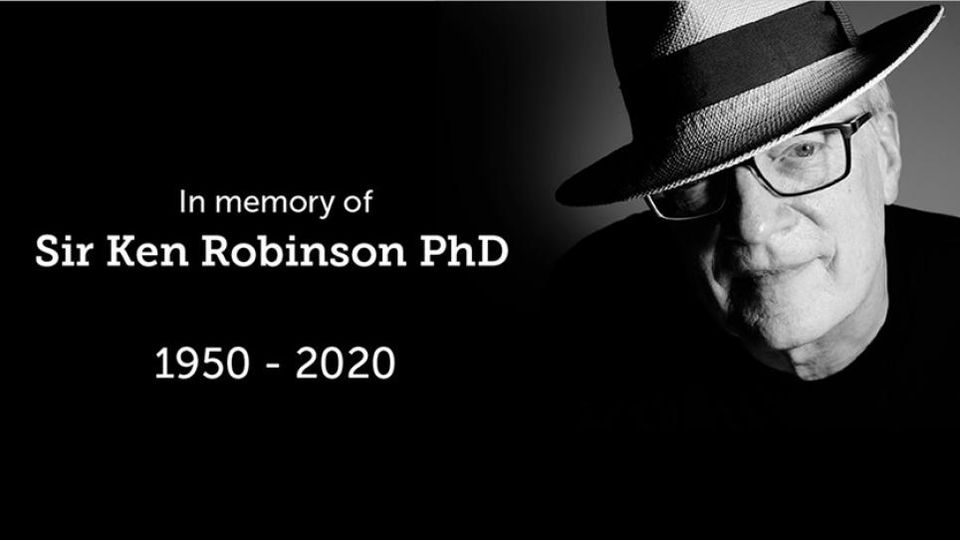Sir Ken Robinson

Remembering former Central governing body member, Honorary Fellow and leading educationist.
The Central community is deeply saddened to learn of the passing of former Central governing body member, Honorary Fellow and leading educationist, Sir Ken Robinson.
It’s difficult to summarise how much of an impact a single person can have on your life, as it is usually only clear in hindsight. We wanted to hear how Sir Ken Robinson impacted the Central community directly, so we asked Sally Mackey, Professor of Applied Theatre and Performance; Associate Director (Research and Projects) to talk about her relationship with one of the world’s most influential educationists.
Remembering Sir Ken Robinson (1950-2020) – a personal thanks
An Honorary Fellow of Central and formerly a member of our Governing Board, millions beyond Central will remember and be saddened to hear of Sir Ken Robinson’s death after a short battle with cancer. I have thanked you before but, in memoriam, I thank you again, Ken; this short tribute is a personal memory.
Nearly twenty years before that seminal TED talk in 2006 (‘Do Schools Kill Creativity’), I heard the yet-to-be-knighted and not-yet-even-a-professor Dr Ken Robinson speak at a couple of relatively small-scale educational events in Northamptonshire. He had been invited by a forward thinking LEA (local education authority – some may remember the heyday of LEAs) Arts Advisor of the county, Bert Gill. Of course, Dr Ken was an irresistible messenger even then, with the now-familiar wit and that embracing voice with a hint of Liverpool accent; he was for sure an inspiration for me, head of an expressive arts faculty in a comprehensive school. The arts in schools changed, nationally, as a result of his influential writing and speaking. In my own county, Northamptonshire, money was found from the local authority to fund artists coming into schools and my pupils benefitted from incoming experts in mime, circus, dance, physical theatre and more. A major force was a book Robinson had edited in 1984, Calouste Gulbenkian Foundation’s The Arts in Schools: Principles, Practices and Provision. I remember, still, going into a Milton Keynes library to borrow a slightly battered, red, small book that exploded with convincing, articulate arguments about the importance of children’s arts education. Thank you for helping me convince others in my school, Dr Ken.
It was because - now-Professor - Ken had taken up a post at Warwick University and because he would be teaching on it, I took a risky year away from teaching to take up a place on a brand new MA in Arts Education and Cultural Studies based in the Education Department there. The intellectual heavyweight and soon-to-be-Professor Fred Inglis led the MA with moments of Professor Ken delighting the dozen fans in Tuesday evening twilight sessions. Theirs was a generous relationship and I couldn’t help feeling a huge sense of privilege at being in their presence. For sure, my life changed as I found I had a brain after all and - no one more surprised than myself - it was enjoying the exercise it was receiving.
During my MA year, a post came up at Central. Professor Ken was on the governing body of Central at that time (1992) and I asked him about this specialist institution in Swiss Cottage: what did he think? What could he tell me about it? He was enormously positive about the institution – particularly about the Education Department at Central and the rigorous training of teachers Central offered. A four-year secondary B.Ed in Drama, it was, indeed, an impressive and weighty degree. With such a recommendation, of course I applied for the post. It was with much pleasure that I turned to The Arts in Schools (then in its second edition) as one of the first texts I used with undergraduate students at Central and spoke about the influence its editor had had on my life and thinking, knowing their lives and thinking would be affected too.
Professor Ken left the Board of Governors soon after that – although not before I had the very real pleasure of ‘welcoming’ him to Central on a visit. I thanked him for recommending the institution! He left Warwick after 12 years (and several books), moving to Los Angeles. Indeed, he moved on to global fame. (That seminal TED talk in 2006 has had over 66 million views – the most viewed TED talk ever, we are told.) It is maybe not surprising how delighted I was, along with the whole of Central, when Professor Sir Ken Robinson was made an Honorary Fellow of Central: we held him in such high esteem.
Acknowledging all that fame, it is with absolute humility that I simply want to say thank you again, for the critical influence you had on my life, Sir Ken.
Professor Sally Mackey, Chair of Applied Theatre and Performance. 27 August 2020
Sir Ken Robinson was best known around the world for his 2006 TED Talk, ‘Do School’s Kill Creativity?’
The obituary of Sir Ken Robinson in The Guardian provides a detailed summary of his life and work.
